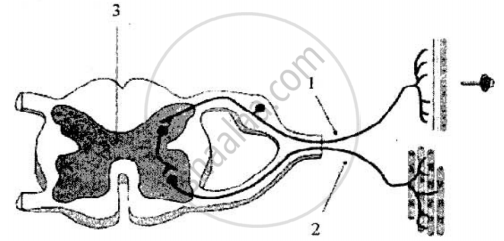Advertisements
Advertisements
Question
What type of reflex is the following?
Solving mathematical sums
Options
simple reflex
conditioned reflex
None of the above
Solution
Conditioned reflex depending upon reasoning and past experience.
APPEARS IN
RELATED QUESTIONS
The diagram given below shows the internal structure of a spinal cord depicting a phenomenon. Study the diagram and answer the questions:

1) Name the phenomenon that is depicted in the diagram. Define the phenomenon.
2) Give the technical term for the point of contact between the two nerve cells.
3) Name the parts numbered 1, 2 and 3.
4) How does the arrangement of neurons in the spinal cord differ from that of the brain?
5) Mention two ways by which the spinal cord is protected in our body.
Give three examples of reflex actions.
A cylindrical structure P in our body begins in continuation with medulla and extends downwards. It is enclosed in a bony cage Q and surrounded by membranes R. As many as x pairs of nerves arise from the structure P. The structure P is involved in the reflex actions of our body and conduction of nerve impulses to and from another organ S of our body with which it forms CNS.
(a) Name the structure P.
(b) Name (i) bony cage Q, and (ii) membranes R.
(c) How much is x?
(d) Name the organs S.
(e) What are the reflexes involving structure P only known as?
Differentiate between the following pair of terms:
Stimulus and impulse
Note the relationship between the first two words and suggest the suitable word/words for the fourth place.
Receptor : Sensory nerve :: Motor nerve : ______.
State whether the following is simple reflex, conditioned reflex or neither of the two.
Sudden application of brakes of the cycle on sighting an obstacle in front
State whether the following is
Playing on the Keyboard
What kind of reflex is cycling?
State whether the following is simple reflex, conditioned reflex or neither of the two.
Sneezing
The diagram given below shows the internal structure of a spinal cord depicting a phenomenon. Study the diagram and answer the following questions.
 |
- Name the phenomenon shown in the figure and define the same.
- Identify the parts labelled as 1 and 2. Write one functional difference between these two.
- Name the bony protective covering and the membranous protective covering of the spinal cord.
- Label the guidelines 3 and 4.
- How is the labelled part 3 different from part 4 with respect to its composition (part of neuron)?
- Give the technical term for the point of contact between the two nerve cells.
- Name the fluid filled inside the central canal of spinal cord.
- Name the term used for a small gap between two neurons.
- Give one example of a neurotransmitter.
- Draw a neat diagram of a nerve cell and label the parts: Perikaryon, Node of Ranvier, Myelin sheath and Axon terminals.
